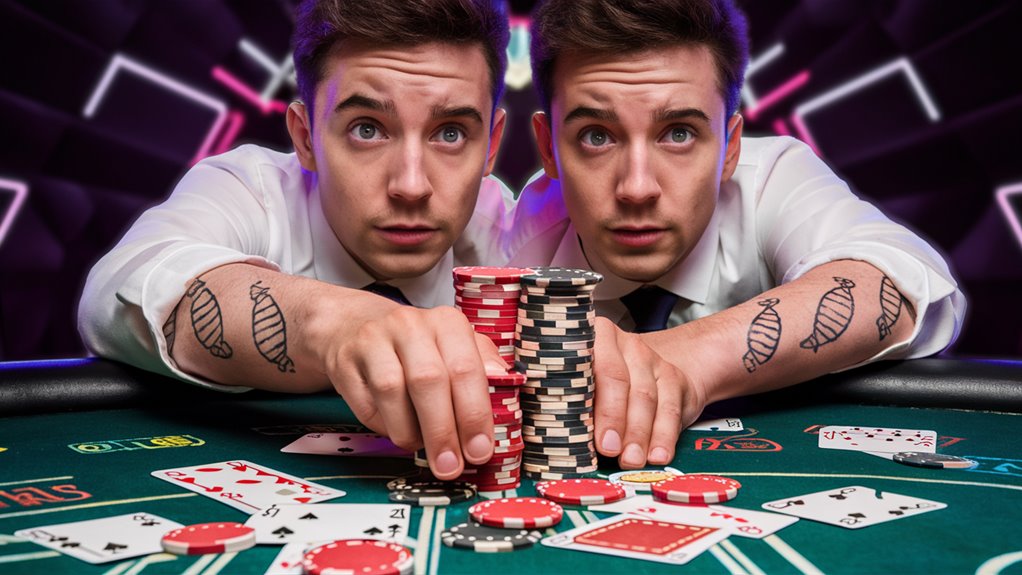
Why People Gamble

The Brain Behind It All
Why take risks? Gamblers often start due to brain signals and past life events. A brain spot, the nucleus accumbens, drives out dopamine during gambling. This makes the brain feel great, often keeping clear thoughts away.
Gene Influence on Gamblers
Specific genes, like DRD2 and DRD4, can tell if someone might fall into gambling. These genes affect how the body reacts to thrilling risks, pulling some into addictive bets.
Childhood and Taking Risks
Important Years
From ages 8-14, the brain develops pathways that judge risks, shaping actions in gambling as one grows. This period makes deep changes in how we balance risk and reward. https://maxpixels.net/
Influences around us
Casino designs and people’s actions use brain patterns to their gain, strongly pulling in risk-takers. These settings team up with brain habits to make risky bet habits.
Looking Closer at Bet Issues
Brain and outside influences make each issue with gambling unique. Understanding these ties helps see the complex mix of addiction and risk choices.
Brain Joy Spots
The joy zone in the brain works using many connected spots that handle fun, drive, and choices. The nucleus accumbens shares dopamine during fun tasks, making us feel happy and ready.
This network directly talks to the prefrontal cortex, controlling top-level thoughts and rushes.
Dopamine and Joy
The ventral tegmental area (VTA) is key to releasing dopamine through uncertain fun moments.
This system pays attention to risky actions, causing errors in reward hopes – when real results don’t meet what we think they’ll be.
Emotions and Memories
The link between the amygdala and hippocampus is vital in feeling and saving good emotions.
This connection shows why happy times often stick longer in our minds than bad times.
Brain scans reveal that chasing such thrills can change these brain paths, making us more sensitive to happy cues while ignoring risks.
Main Joy Centers
- Nucleus Accumbens: Main happy spot
- Prefrontal Cortex: Top choice maker
- Ventral Tegmental Area: Shares dopamine
- Amygdala: Handles feelings
- Hippocampus: Makes memories
Impact of Early Years
Early times set deep roots in risk habits and may lead to gambling.
Kids around betting often fall into risky behaviors later on.
Such early touches deeply mark the young brain’s joy paths, leaving long effects.
Hard Young Years and Places
Hard early years and shaky homes are strongly tied to later gambling.
Kids who face neglect, harm, or money troubles often show weak rush control.
The key years from 8-14 are vital, as watching risky acts then leaves deep marks on the brain.
Brain Growth and Bold Moves
Child stress directly changes dopamine receivers, possibly leading to a draw to high-risk fun.
The tight mix of genes and outside pushes during important growth times sets the stage for later gambling habits.
This effects joy seeking and choice-making skills later in life.
Main Risk Factors
- Early gambling life
- Family gambling track
- Child tough times
- Place stress
- Important growth times
Gene Risks
Genes and Gambling Issues
Brain Links and Joy Paths
A natural lean to gambling issues comes from gene shifts in joy systems and brain paths.
Studies show that certain gene types changing dopamine paths, like DRD2 and DRD4, deeply touch gambling risks. These gene marks shift how risks and joy feel during bold moves.
Serotonin Gene Roles
Shifts in the 5-HTTLPR gene play a big part through their impact on rush and feelings.
Research shows people with certain gene types are up to 50% more likely to tackle gambling issues than others.
Genes and Brain Links and Starts
Genes blend deeply with brain systems, mainly hitting the thought area and feeling centers.
These gene-brain links affect:
- Top choice skills
- Decision paths
- Joy system checks
Twin studies show starts of 50-60% for gambling issues, showing a big gene role in risky acts. This large gene piece underlines the need to get gene facts for stopping and fixing gambling troubles.
People and Place Pushes
Influences from Folks and Spots in Betting Actions
People’s Sway in Betting Ways
People and places create deep currents that lift gambling actions.
Friends and cool spots often make intense betting seem usual, while strong ads from betting spots make environments that lift betting wants.
The casino layouts purposely include endless lights, no clocks, and smart designs to keep players playing.
Money Roles and Easy Paths
Money settings shape how much and how people bet.
Poor areas often see strong ads showing betting as a way out of money troubles.
The smart setup of betting spots, mixed with social media’s bet glamour, makes a place that pulls more players. Targeted ad runs aimed at easy targets boost these place pushes.
New Betting Ways
The start of betting apps has changed the betting game.
These apps turn alone betting into connected fun, making group bet events through online links.
This new tech shapes new group pushes that back heavy gambling through non-stop links and group cheers.
Main Place Pressure Spots
- Casino brain tricks
- Strong ad places
- Digital links
- Friend pull
- Money area aims
Deep Betting Drives
The Deep Pushes in Betting Actions

The Brain Starts of Gambling Brain Tricks
The base bits of brain tricks are key to betting acts, deep in brain patterns.
These inner works create strong pulls that build risky choices and betting ways.
Joy Chemicals and Happy Systems
Dopamine share is key to supporting betting acts.
The brain’s happy system kicks in during both wins and near-wins, making an addictive cycle of waiting and joy.
Brain twists, like thinking you can sway outcomes or the game’s slip, boost these brain answers.
Main Brain Pushes
Top Pushes
- Running from sad states
- Chase for thrills and fun
- Wish to get back losses
These action pushes work under our knowing, making them hard to see and control.
Each push can work alone or mix to make added effects, making a complex web of driving forces.
How Different People Act
The push of these brain answers changes a lot among people, moved by:
- Gene leans
- Stress handling skills
- Past betting times
- Brain happy leans
The mixed play of these bits results in one-of-a-kind betting moves and risk thoughts in each person.
Now’s Help Ways
Today’s Help Plans for Gambling Issues
Working Aid Moves
Cognitive Behavioral Therapy (CBT) is a main way to help bet troubles, aiding folks see and switch bad betting moves. Casino Psychology, Designed to Make You Stay
Motivational Talking (MI) goes well with it, building drive to change ways.
Drug Help and Group Help
Drug help using antidepressants (SSRIs) and urge blockers cuts down bet urges and tricky acts.
Help groups and Gamblers Anonymous plans, built on the tested 12-step recovery plan, give needed friend backing and answer setups.
Mind ways better emotional and mind coping skills.
Broad Help Mix
Money talking is key in today’s help plans, touching real bits of bet issues.
Family talking sees the big hit on family moves, healing through:
- Better family talks
- Fixing links
- Stronger backing groups
- Joined fix tries
This mixed support plan makes sure full eye on mind, social, and real bits, lifting help works and bringing long good ends.